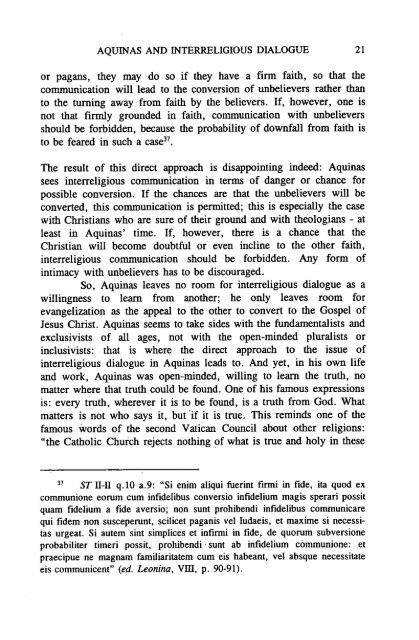Jaarboek Thomas Instituut 1997 - Thomas Instituut te Utrecht
Jaarboek Thomas Instituut 1997 - Thomas Instituut te Utrecht
Jaarboek Thomas Instituut 1997 - Thomas Instituut te Utrecht
Create successful ePaper yourself
Turn your PDF publications into a flip-book with our unique Google optimized e-Paper software.
AQUINAS AND INTERRELIGIOUS DIALOGUE 21<br />
or pagans, they may do so if they have a firm faith, so that the<br />
communication will lead to the conversion of unbelievers rather than<br />
to the turning away from faith by the believers. If, however, one is<br />
not that firmly grounded in faith, communication with unbelievers<br />
should be forbidden, because the probability of downfall from faith is<br />
to be feared in such a case".<br />
The result of this direct approach is disappointing indeed: Aquinas<br />
sees in<strong>te</strong>rreligious communication in <strong>te</strong>rms of danger or chance for<br />
possible conversion. If the chances are that the unbelievers will be<br />
conver<strong>te</strong>d, this communication is permit<strong>te</strong>d; this is especially the case<br />
with Christians who are sure of their ground and with theologians - at<br />
least in Aquinas' time. If, however, there is a chance that the<br />
Christian will become doubtful or even incline to the other faith,<br />
in<strong>te</strong>rreligious communication should be forbidden. Any form of<br />
intimacy with unbelievers has to be discouraged.<br />
So, Aquinas leaves no room for in<strong>te</strong>rreligious dialogue as a<br />
willingness to learn from another; he only leaves room for<br />
evangelization as the appeal to the other to convert to the Gospel of<br />
Jesus Christ. Aquinas seems to take sides with the fundamentalists and<br />
exclusivists of all ages; not with the open-minded pluralists or<br />
inclusivists: that is where the direct approach to the issue of<br />
in<strong>te</strong>rreligious dialogue in Aquinas leads to. And yet, in his own life<br />
and work, Aquinas was open-minded, willing to learn the truth, no<br />
mat<strong>te</strong>r where that truth could be found. One of his famous expressions<br />
is: every truth, wherever it is to be found, is a truth from God. What<br />
mat<strong>te</strong>rs is not who says it, but 'if it is true. This reminds one of the<br />
famous words of the second Vatican Council about other religions:<br />
"the Catholic Church rejects nothing of what is true and holy in these<br />
37 ST IT-ITq.lO a.9: "Si enim aliqui fuerint firmi in fide, ita quod ex<br />
communione eorum cum infidelibus conversio infidelium magis sperari possit<br />
quam fidelium a fide aversio; non sunt prohibendi infidelibus communieare<br />
qui fidem non susceperunt, scilicet paganis vel Iudaeis, et maxime si necessitas<br />
urgeat. Si au<strong>te</strong>m sint simplices et infirmi in fide, de quorum subversione<br />
probabili<strong>te</strong>r timeri possit, prohibendi· sunt ab infidelium córnmunione: et<br />
praecipue ne magnam familiarita<strong>te</strong>m cum eis habeant, vel absque necessita<strong>te</strong><br />
eis communicent" (ed. Leonina, VID, p. 90-91).








